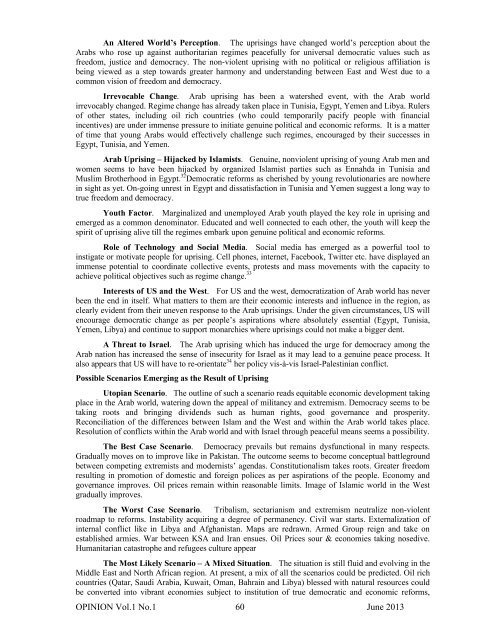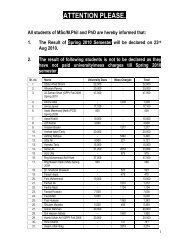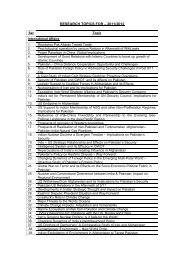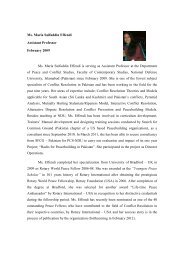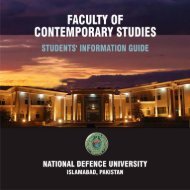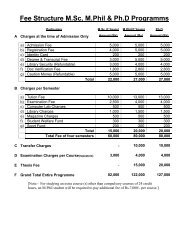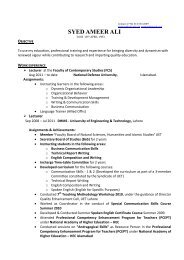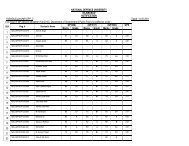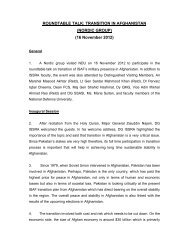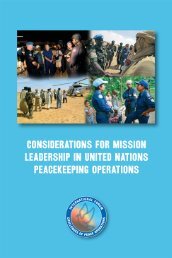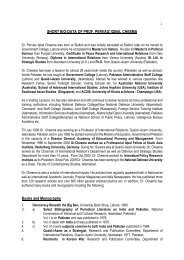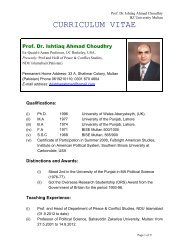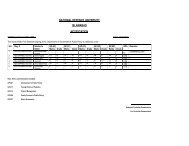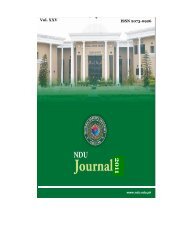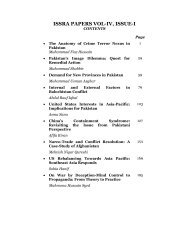OPINION Vol.1, No.1 June 2013 - National Defence University
OPINION Vol.1, No.1 June 2013 - National Defence University
OPINION Vol.1, No.1 June 2013 - National Defence University
You also want an ePaper? Increase the reach of your titles
YUMPU automatically turns print PDFs into web optimized ePapers that Google loves.
An Altered World’s Perception. The uprisings have changed world’s perception about the<br />
Arabs who rose up against authoritarian regimes peacefully for universal democratic values such as<br />
freedom, justice and democracy. The non-violent uprising with no political or religious affiliation is<br />
being viewed as a step towards greater harmony and understanding between East and West due to a<br />
common vision of freedom and democracy.<br />
Irrevocable Change. Arab uprising has been a watershed event, with the Arab world<br />
irrevocably changed. Regime change has already taken place in Tunisia, Egypt, Yemen and Libya. Rulers<br />
of other states, including oil rich countries (who could temporarily pacify people with financial<br />
incentives) are under immense pressure to initiate genuine political and economic reforms. It is a matter<br />
of time that young Arabs would effectively challenge such regimes, encouraged by their successes in<br />
Egypt, Tunisia, and Yemen.<br />
Arab Uprising – Hijacked by Islamists. Genuine, nonviolent uprising of young Arab men and<br />
women seems to have been hijacked by organized Islamist parties such as Ennahda in Tunisia and<br />
Muslim Brotherhood in Egypt. 32 Democratic reforms as cherished by young revolutionaries are nowhere<br />
in sight as yet. On-going unrest in Egypt and dissatisfaction in Tunisia and Yemen suggest a long way to<br />
true freedom and democracy.<br />
Youth Factor. Marginalized and unemployed Arab youth played the key role in uprising and<br />
emerged as a common denominator. Educated and well connected to each other, the youth will keep the<br />
spirit of uprising alive till the regimes embark upon genuine political and economic reforms.<br />
Role of Technology and Social Media. Social media has emerged as a powerful tool to<br />
instigate or motivate people for uprising. Cell phones, internet, Facebook, Twitter etc. have displayed an<br />
immense potential to coordinate collective events, protests and mass movements with the capacity to<br />
achieve political objectives such as regime change. 33<br />
Interests of US and the West. For US and the west, democratization of Arab world has never<br />
been the end in itself. What matters to them are their economic interests and influence in the region, as<br />
clearly evident from their uneven response to the Arab uprisings. Under the given circumstances, US will<br />
encourage democratic change as per people’s aspirations where absolutely essential (Egypt, Tunisia,<br />
Yemen, Libya) and continue to support monarchies where uprisings could not make a bigger dent.<br />
A Threat to Israel. The Arab uprising which has induced the urge for democracy among the<br />
Arab nation has increased the sense of insecurity for Israel as it may lead to a genuine peace process. It<br />
also appears that US will have to re-orientate 34 her policy vis-à-vis Israel-Palestinian conflict.<br />
Possible Scenarios Emerging as the Result of Uprising<br />
Utopian Scenario. The outline of such a scenario reads equitable economic development taking<br />
place in the Arab world, watering down the appeal of militancy and extremism. Democracy seems to be<br />
taking roots and bringing dividends such as human rights, good governance and prosperity.<br />
Reconciliation of the differences between Islam and the West and within the Arab world takes place.<br />
Resolution of conflicts within the Arab world and with Israel through peaceful means seems a possibility.<br />
The Best Case Scenario. Democracy prevails but remains dysfunctional in many respects.<br />
Gradually moves on to improve like in Pakistan. The outcome seems to become conceptual battleground<br />
between competing extremists and modernists’ agendas. Constitutionalism takes roots. Greater freedom<br />
resulting in promotion of domestic and foreign polices as per aspirations of the people. Economy and<br />
governance improves. Oil prices remain within reasonable limits. Image of Islamic world in the West<br />
gradually improves.<br />
The Worst Case Scenario. Tribalism, sectarianism and extremism neutralize non-violent<br />
roadmap to reforms. Instability acquiring a degree of permanency. Civil war starts. Externalization of<br />
internal conflict like in Libya and Afghanistan. Maps are redrawn. Armed Group reign and take on<br />
established armies. War between KSA and Iran ensues. Oil Prices sour & economies taking nosedive.<br />
Humanitarian catastrophe and refugees culture appear<br />
The Most Likely Scenario – A Mixed Situation. The situation is still fluid and evolving in the<br />
Middle East and North African region. At present, a mix of all the scenarios could be predicted. Oil rich<br />
countries (Qatar, Saudi Arabia, Kuwait, Oman, Bahrain and Libya) blessed with natural resources could<br />
be converted into vibrant economies subject to institution of true democratic and economic reforms,<br />
<strong>OPINION</strong> <strong>Vol.1</strong> <strong>No.1</strong> 60 <strong>June</strong> <strong>2013</strong>


